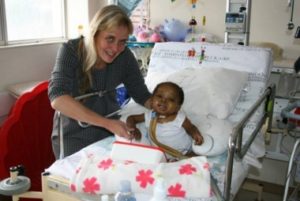Despite all its history South Africa is still classified by the UN as a developing nation. By 2015 it had the 33nd largest Gross Domestic Product in the world of nearly $350 billion. In 2016 its population was reaching 55 million.
Applying an accepted aHUS incidence rate of 0.4% per million population per year , there would be around 22 aHUS patients on-setting each year in South Africa , with a surviving prevalence of about 170 patients; but probably lower.
It is not known how many actual aHUS patients there are in South Africa there are no records . In fact there is very little known about aHUS in South Africa.
An internet search does not reveal any aHUS patient group ,nor many articles about the disease and its treatment. Except when using the search term ” eculizumab” when a couple of examples of public patient engagement emerge; but then only about PNH.
The first is a testimony by Alexandra Macdonald, a PNH patient, who is seeking access to eculizumab to treat her PNH.
The second is about a petition on behalf of Alexandra to make eculizumab available to her as Alexion will not allow South African pharmacies and doctors to bring it into the country to treat patients. Alexion consented to do so for Alexandra as a result.
Nothing in the public domain about aHUS.
aHUS alliance did receive one response from a South African aHUS patient to its 2016 Global Survey ; but as the privacy and confidentiality of respondents was paramount in the way the survey was conducted it does not know who that patient was.
aHUS patients do exist in South Africa and there are South African clinicians with an interest in the disease.
The alliance is aware of the work by Dr Errol Gottlich of Johannesburg in the field of Combined Liver Kidney Transplant for aHUS patients with end stage renal failure. Similarly Prof. Mignon McCulloch has extensive experience of treating children with aHUS at the Red Cross War Memorial Childrens’ Hospital in Cape Town .

Prof. Mignon McCulloch
So aHUS patients exist, clinicians are working towards their best treatment; but uncertainties about access to complement inhibitors presents a barrier.
As patients with PNH have found out, pharmaceutical companies are reluctant to bring drugs to market in South Africa . This is because of the country’s patent laws which create risks, particularly for those used to treat more common illnesses. Those with rare diseases are even more disadvantaged.
This issue is beyond the capability of aHUS patients alone in South Africa to change; but it is one for the South African Rare Diseases Community in conjunction with UN NGO Committee for Rare Diseases to shed a light on and search for a solution to the aHUS problem in South Africa.

